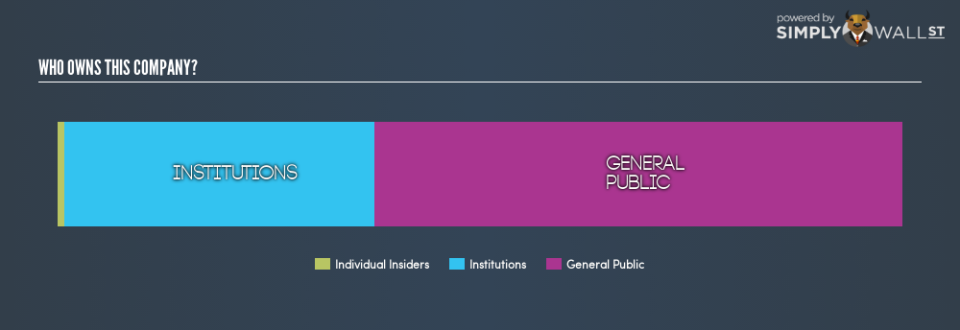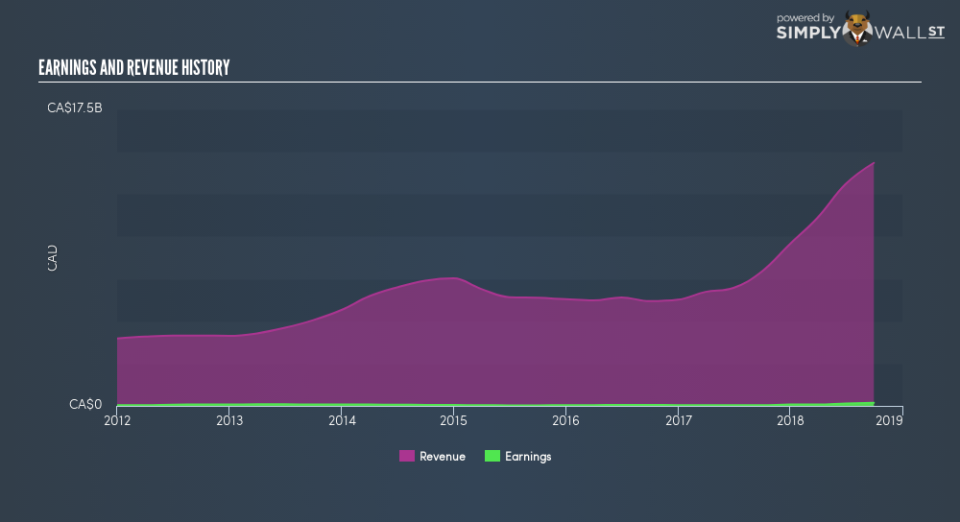What Kind Of Shareholders Own Parkland Fuel Corporation (TSE:PKI)?

If you want to know who really controls Parkland Fuel Corporation (TSE:PKI), then you’ll have to look at the makeup of its share registry. Institutions often own shares in more established companies, while it’s not unusual to see insiders own a fair bit of smaller companies. We also tend to see lower insider ownership in companies that were previously publicly owned.
Parkland Fuel has a market capitalization of CA$4.5b, so it’s too big to fly under the radar. We’d expect to see both institutions and retail investors owning a portion of the company. Taking a look at the our data on the ownership groups (below), it’s seems that institutions are noticeable on the share registry. We can zoom in on the different ownership groups, to learn more about PKI.
See our latest analysis for Parkland Fuel
What Does The Institutional Ownership Tell Us About Parkland Fuel?
Institutions typically measure themselves against a benchmark when reporting to their own investors, so they often become more enthusiastic about a stock once it’s included in a major index. We would expect most companies to have some institutions on the register, especially if they are growing.
We can see that Parkland Fuel does have institutional investors; and they hold 37% of the stock. This implies the analysts working for those institutions have looked at the stock and they like it. But just like anyone else, they could be wrong. It is not uncommon to see a big share price drop if two large institutional investors try to sell out of a stock at the same time. So it is worth checking the past earnings trajectory of Parkland Fuel, (below). Of course, keep in mind that there are other factors to consider, too.
Hedge funds don’t have many shares in Parkland Fuel. Quite a few analysts cover the stock, so you could look into forecast growth quite easily.
Insider Ownership Of Parkland Fuel
The definition of company insiders can be subjective, and does vary between jurisdictions. Our data reflects individual insiders, capturing board members at the very least. Company management run the business, but the CEO will answer to the board, even if he or she is a member of it.
Insider ownership is positive when it signals leadership are thinking like the true owners of the company. However, high insider ownership can also give immense power to a small group within the company. This can be negative in some circumstances.
Our most recent data indicates that insiders own less than 1% of Parkland Fuel Corporation. It is a pretty big company, so it would be possible for board members to own a meaningful interest in the company, without owning much of a proportional interest. In this case, they own around CA$39m worth of shares (at current prices). It is good to see board members owning shares, but it might be worth checking if those insiders have been buying.
General Public Ownership
The general public, who are mostly retail investors, collectively hold 62% of Parkland Fuel shares. This level of ownership gives retail investors the power to sway key policy decisions such as board composition, executive compensation, and the dividend payout ratio.
Next Steps:
It’s always worth thinking about the different groups who own shares in a company. But to understand Parkland Fuel better, we need to consider many other factors.
I always like to check for a history of revenue growth. You can too, by accessing this free chart of historic revenue and earnings in this detailed graph.
Ultimately the future is most important. You can access this free report on analyst forecasts for the company.
NB: Figures in this article are calculated using data from the last twelve months, which refer to the 12-month period ending on the last date of the month the financial statement is dated. This may not be consistent with full year annual report figures.
To help readers see past the short term volatility of the financial market, we aim to bring you a long-term focused research analysis purely driven by fundamental data. Note that our analysis does not factor in the latest price-sensitive company announcements.
The author is an independent contributor and at the time of publication had no position in the stocks mentioned. For errors that warrant correction please contact the editor at editorial-team@simplywallst.com.

 Yahoo Finance
Yahoo Finance 

